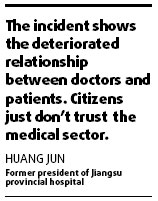A baseless rumor circulated on the Internet about doctors being infected with HIV/AIDS after sex with a pharmaceutical sales woman has reinvigorated debate about medical bribery.
 The rumor was so widely published online that it forced Jiangsu provincial hospital to take the extraordinary step of publicly denying any of its staff were infected with the deadly virus. It said the hospital's reputation had been severely damaged by the rumor.
The rumor was so widely published online that it forced Jiangsu provincial hospital to take the extraordinary step of publicly denying any of its staff were infected with the deadly virus. It said the hospital's reputation had been severely damaged by the rumor.
The hospital said that the netizen who fueled the rumor was known to them. The man was once a patient in the hospital's urology unit and was unpleased with his treatment, it said.
The China Youth Daily newspaper reported that police briefly detained this man, who was one of a number of netizens who posted messages on Xici.net.
After being released by police, the netizen posted an apology on the same forum in which he said the rumor was groundless and imaginary.
Despite the hospital's statement and the netizen's admission, there continues to be accusations of bribery in the medical sector.
"The incident shows the deteriorated relationship between doctors and patients. Citizens just don't trust the medical sector," Huang Jun, former president of Jiangsu provincial hospital told China Youth Daily.
Yin Kaisheng, a respiratory disease doctor at Jiangsu provincial hospital, said medical bribery existed at many hospitals.
Meanwhile, a medical worker surnamed Deng at a different Nanjing hospital said: "The bribery of doctors and nurses by pharmaceutical sales representatives is a tacit rule of the medical industry."
Deng, who has worked in the medical industry for 30 years, said pharmaceutical sales people bribed doctors and nurses so they would prescribe products from their company.
The bribes took the form of sex, dinner invitations or money. Medical staff could be offered up to a 30 percent cut on sales, she said.
Chief physicians could make 100,000 yuan ($15,000) and head nurses could earn 8,000 yuan every month, she said.
"The government has attempted to crack down on medical bribery every year, but it has failed to tackle the problem," she said.
Zhu Hengpeng, a researcher with the institute of economics at the Chinese Academy of Social Sciences, said medical bribery was also common in the United States, Japan and many other countries.
It was inevitable under the present medical system because the hospital and the doctor had the power to prescribe medicine, and the drug company could easily know what the doctor had sold, he said.
(Xinhua News Agency May 28, 2009)